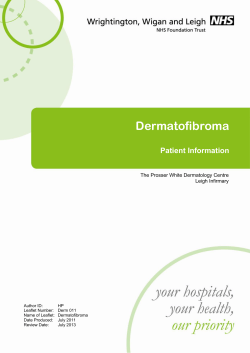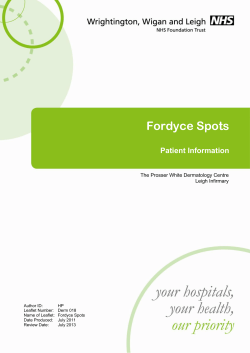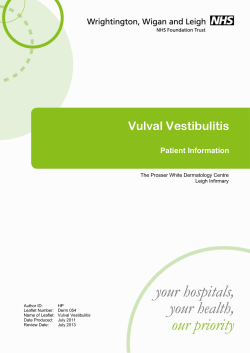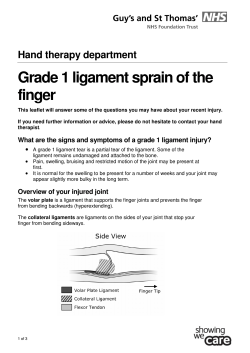
Endocrine Advisory Group Meeting 2 September 2003
Endocrine Advisory Group Meeting 2 September 2003 Green Room Velindre NHS Trust Present: Mr D Scott-Coombes Chairman Dr C Evans Mr M Foster Mr S Ghosh Mr P Holland Mr A Masoud Mr H Morgan Dr L Moss Dr P Laidler Prof J Lazarus Dr M Page Mr J Rees Mr S Shering Ms H Trotman Consultant Biochemist Cardiff and Vale NHS Trust Consultant Surgeon Pontypridd and Rhondda NHS Trust Consultant Surgeon Gwent Healthcare Trust Consultant Surgeon Gwent Healthcare Trust Consultant Surgeon North Glamorgan NHS Trust SE Wales Cancer Network Manager Consultant Oncologist Velindre NHS Trust Consultant Pathologist Cardiff and Vale NHS Trust Consultant Physician Cardiff and Vale NHS Trust Consultant Physician Pontypridd and Rhondda NHS Trust Consultant Radiologist Cardiff and Vale NHS Trust Consultant Surgeon Bro Morgannwg NHS Trust Nurse Specialist Velindre NHS Trust Apologies for Absence Mr K Shute Mr G Pritchard Mr R Williams Dr M Varma Mr Lodhi Mr Lewis Dr S Hanna Mr R Jones In attendance: Mrs J Morris Deputy Project Manager, CaNISC Project Action 1. Notes of the Meeting 3 June 2003 The notes of the meeting held on 3 June were accepted as a true record. 2. Matters Arising BTA Guidelines Dr Moss asked for clarification of the agreement reached at the meeting regarding referral to an oncologist. It was accepted that all new patients should be notified to the oncologist, and all patients with a tumour greater than 10mm should be referred. This did not preclude a surgeon referring patients with a tumour of less than 10mm. Membership Mr Scott-Coombes referred to a letter received from Dr Leslie Williams, Consultant Radiologist at Velindre. It was agreed that he write to Dr Williams to apologise and assure him that his contribution had not been ignored, but that initially he had been unclear as to who was involved in the service in SE Wales. 3. All Wales Dataset for Thyroid Cancer The Chairman welcomed Mrs Jenny Morris, Deputy Project Manager for the Cancer Information Framework. Mrs Morris gave a short background to the project and to the development of the CaNISC system. She explained that a series of pilot sites had been developed to start collecting the dataset for specific cancers, and to share this and other clinical information between all members of the MDT. Head & Neck cancers formed part of Phase 2 of the project, but it had been pointed out by Dr Moss that thyroid cancer was not adequately covered in the head & neck dataset. Mrs Morris was therefore looking for advice as to what data items were required, and whether it should form a separate dataset. Following a discussion, it was clear that the group favoured a separate thyroid dataset as the key clinical aspects and management of this cancer differed greatly from head & neck cancers. It was proposed in the first instance to look at the datasets in use at Guy’s & St Thomas’ and at Newcastle to see if they could form a model for the development of an all Wales dataset. Mr Scott-Coombes agreed to liaise with Mrs Morris on this. 4. Thyroglobulin, rhTSH and cancer follow-up Dr Evans questioned whether there was an agreement over the criteria used to discuss which patients should receive thyroglobulin or thyroxin. There were in particular, concerns over false negatives. Mr Scott-Coombs noted that the British Thyroid Association (BTA) guidelines suggested measuring a non-stimulated thyroglobulin in follow-up. Professor Lazarus pointed out that US evidence pointed to a place for rhTSH. Dr Moss was unsure whether a change in practice would lead to a major improvement in patient care, but suggested there may be benefits in more regular imaging of patients with antibodies. She was currently using rhTSH on a patient-by-patient basis after contacting the Drugs and Therapeutics Committee, and patients were very pleased with their quality of life after withdrawal from thyroxin. She felt that word would spread, but blanket use would have major cost implications. It was agree to maintain current practice, but to keep it under review. 5. Multidisciplinary Meetings Dr Moss explained that the revised All Wales Standards were likely to suggest that there should be a Multidisciplinary Meeting (MDM) at least fortnightly. She questioned whether there was an opportunity to establish a South Wales wide MDM. Mr Scott-Coombes felt that, as there were so few patients, such a meeting could be impractical. Mr Ghosh wondered whether a monthly meeting at UHW, with other presenting cases via teleconferencing links, was possible. The problem with this was that many cases would have to be discussed retrospectively, although there were educational benefits of this. It was proposed that a S E Wales wide Multidisciplinary Team (MDT) be established, and that an agreed series of protocols could act as a proxy for an MDM (as happened currently with malignant melanoma). These protocols would be audited annually, and the results discussed at an annual meeting of the MDT, where the protocols would be reviewed. It was agreed that Mr Scott-Coombes would write to Professor Malcolm Mason, Chairman of All Wales Standards Group, to discuss the suitability of such an approach. It was also agreed that an annual educational meeting of the MDT should be established, open to specialist registrars from all appropriate disciplines. 6. Any Other Business 6.1 Prof Lazarus reminded members of the forthcoming meeting of the European Thyroid Association in Edinburgh, and a meeting in Newcastle on October 17. 6.2 It was proposed that the following issues should be discussed at future meetings:• possibility of centralising treatment of medullary cancers • protocol for pre-operative staging • referral guidelines 6.3 It was agreed to share e-mail addresses amongst members of the group 7. Date and Time of Next Meeting The next meeting would be held at 3.30pm on Tuesday 20 January 2004, in the Green Room, Velindre Hospital.
© Copyright 2025





















